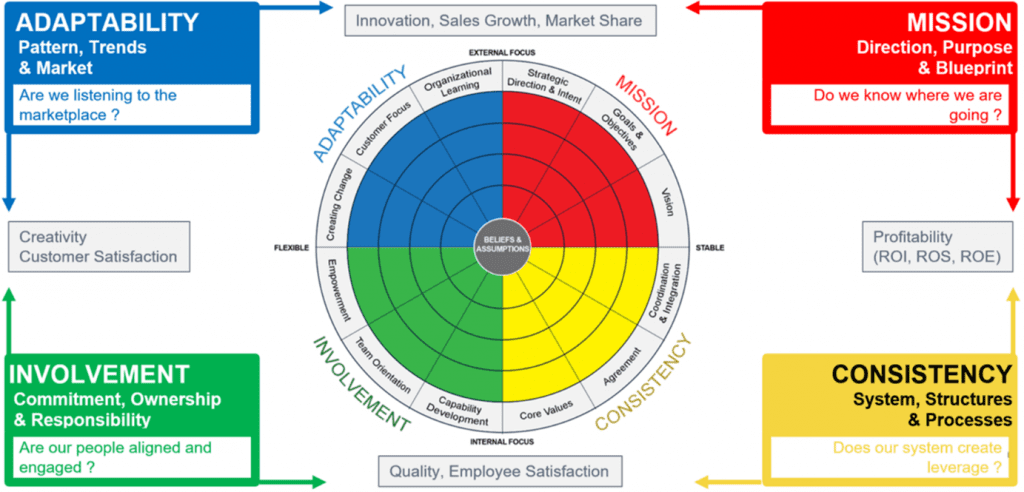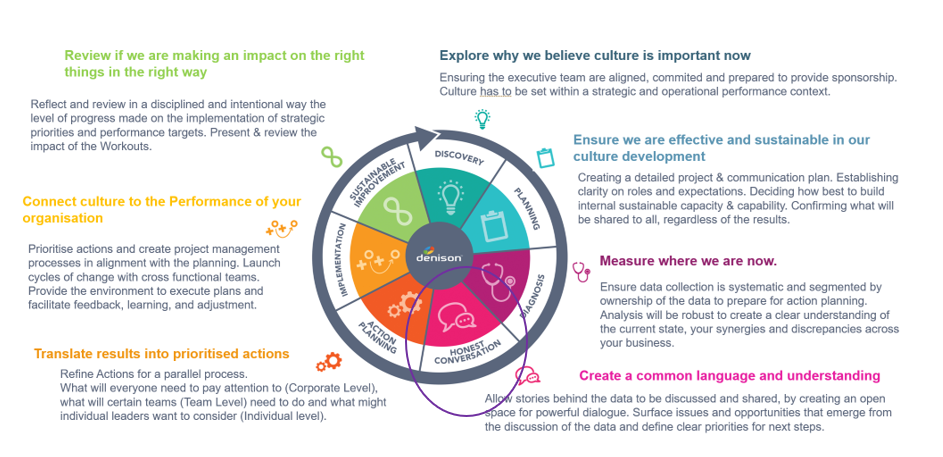Employee Involvement: To Retain the Best People, Create Real Opportunities to Value the ‘Best’ in Them.
David Boddy, Developer of ‘Creative Conversation Circles’, Senior Partner, ASIS Business Coach, London UK. Strategic Partner to Denison Consulting Europe.
Karen Jones, Managing Director of Consulting & Partnerships, Denison Consulting Europe.
James is typical of the modern, fast-rising, talented middle manager struggling to get to the top table. His pay and bonuses are healthy, even in these hard times. He is doing well, meeting targets, and gaining a great reputation with his clients. The company is stable, and yet he has mentally taken the decision that it is better for him to find another employer than to stay put. Why? In his own words:
“I don’t get the sense that my voice is being heard; that my ideas really matter. In every appraisal, I’m told how good I am and how great my results are. Sure, they reward me financially. But I know they don’t really value me – because they don’t create opportunities for me to give my best ideas.”
James is one of countless next-generation leaders who have ‘checked out’, mentally and emotionally and will not stay with his employer for very much longer. His commitment to the company is waning – he puts it at no more than 60%, whereas it used to be “110%, if not more.” He is still professional in all his dealings, but the fire and energy of total engagement are going out. If he stays, it will be extinguished completely. He knows it is now imperative, for his own well-being, that he moves.
Top talent retention is one of the biggest challenges facing European businesses today. What is too little recognized is that retention of talent is so much more than bumping up pay packets, handing out ‘loyalty cheques’, or packing off ‘award-winners’ to the Caribbean for some R&R in the sun.
The early Greeks – around 400BC – discovered something about the human condition, long before the FTSE 500 was even thought of. They recognised a link between human happiness and the development of intelligence; that people needed mental and emotional space to not only “find themselves”, but to express themselves. And if this space was not given, the lives of talented people would be stunted, and society as a whole would be far poorer. And so, led by characters such as Socrates, Plato, Aristotle, and others, they evolved the process called ‘Dialogue’. A typical meeting – an Assembly, they called it – contained around 6000 people; quite some meeting to manage!! Their Dialogues did not begin with an agenda; they began with a question. The Assembly would have to “suspend” thought, opinion, and judgment as each contributor spoke; and subsequent speakers would have to build on previous contributions before making their own. Their aim was for something new to arise; something beyond previous answers, something creative. Beyond that, their aim was to create an atmosphere of involvement and engagement for every participant; to ensure every person present was valued. It must have worked. The early Greek civilisation lasted 1500 years.
Denison Consulting Europe understands the importance of co-creating high-performance organisational cultures with teams who will deliver value for the customer. A key question that leaders need to pose themselves, is “Are we bringing everyone with us?”
- Are we managing the dynamic tension between Mission and Involvement? Does everyone understand and feel recognised for the contribution they make?
- Are our systems and processes set up to enable us to keep the promises we make to each other and our customers?

The whole purpose of diagnosing what your teams believe and assume to be true, following their perception of what they experience to be happening around them, is to drive honest conversations. Talking honestly within an atmosphere of psychological safety is much easier to request than achieve.

Creating an inclusive culture is a journey. When done well it can drive ownership through respect, recognition, and challenging invitation. It does require a method and approach capable of holding tough conversations that come both from the heart and head.
The experience of participants in Creative Conversation Circles is that they get plenty of space to think and then contribute. The “discipline” of the Circles emulates the early Greeks. First, listen all the way through, and certainly not to the thoughts in your own whirling mind. Second, adopt an attitude of respect for the speaker. Next, suspend inner judgment. Finally, give voice to what you really think and feel, building on what has already taken place.
When well facilitated, the Circle nearly always delivers something creative. It might be a fresh idea, or it might be looking at a problem from a different angle. More significantly, every participant in the dialogue knows that their point of view has been listened to, has been valued, and that they have had the opportunity to contribute fully. They feel good about themselves. With that, their commitment grows to the Mission of the company, its Core Values, and its future.
Getting the best out of people, and practically demonstrating that they are valued, is key to top talent retention. The drift towards acceptance of working from home is an additional challenge to achieving commitment and engagement, as British inventor Sir James Dyson recently pointed out. Because this challenge is less obvious and more subtle, it is often not recognised or responded to until the talent walks out of the door. The problem started well before that, and the remedy was available in every meeting.
A question that we wish to pose to every senior manager or Leader:
“Do your meetings provide the mental and emotional space for every participant to give their best and for their talent to be fully valued?”
If they don’t, don’t be surprised when your talent walks.






